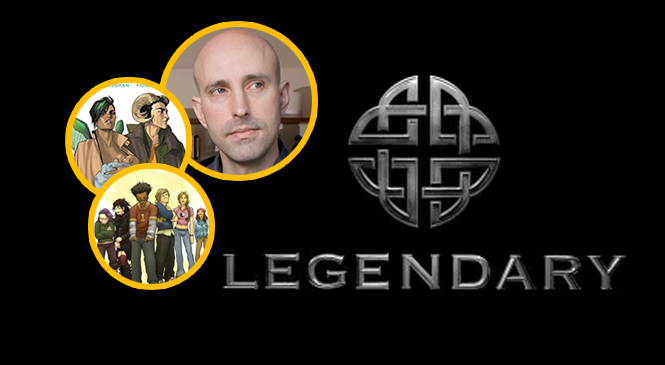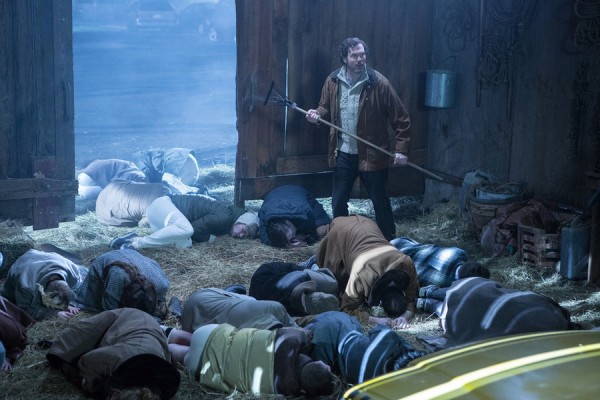Examining Brian K. Vaughan’s Deal with Legendary

If you follow any of the websites that report on movies, TV and comics, you could hardly miss Friday’s news that Brian K. Vaughan has signed an eight-figure, three-year development deal with Legendary Entertainment. Variety, Deadline, The Hollywood Reporter, CBR, Bleeding Cool and many more briefly described the deal and all posted the following quotes:
“Legendary was instrumental in helping to revolutionize the way the world thought of comic book movies, so it’s a tremendous honor to work with them on adaptations of some of my and my talented collaborators’ past and current comics, and I’m looking forward to hopefully creating a few wholly original stories with them as well.”
- Brian K. Vaughan
“Through truly inspired storytelling, Brian has created immersive, compelling worlds that are devoured by fans worldwide. We couldn’t be more thrilled to work with Brian to bring his visions and extraordinary library of work to the screen.”
- Nick Pepper, President, Legendary Television Studios
Sounds great, yes? For fans of the wide-ranging talents of Vaughan, this is, in fact, pretty wonderful news. Vaughan is an award-winning writer and television producer, and Legendary Entertainment helped make producing comic book movies an actual successful business, but outside of fans of Vaughan’s work, why should the average viewer actually care? After all, for the greater public, enjoying the SPIDER-MAN, THE AVENGERS, WONDER WOMAN and X-MEN films doesn’t rely on their knowing who Steve Ditko, Steve Englehart, George Pérez, and Chris Claremont are, no matter how influential those writers were on what made it to the theater screens and the world-wide popularity of the superhero film.
SO WHO IS BRIAN K. VAUGHAN?
 First of all, the “average” viewer is actually probably already familiar with Vaughan’s work, whether they recognize his name or not. Outside of his comic book work, Vaughan produced 29 episodes of Lost, wrote seven of the more critically acclaimed episodes, including the third-season’s “Catch-22”, and was hired by Stephen Spielberg to adapt Stephen King’s Under the Dome for television. While fans may argue how both of those shows played out in their final seasons, Vaughan’s time with both series – story editor, writer and producer during seasons 3-5 of Lost; executive producer, show runner and writer of the first season of Under the Dome – were among the most popular and critically acclaimed. Lost in particular has had – for good and ill – a significant influence on how long-form storytelling is done on television, bringing it more in line with how comic books have been telling stories for decades.
First of all, the “average” viewer is actually probably already familiar with Vaughan’s work, whether they recognize his name or not. Outside of his comic book work, Vaughan produced 29 episodes of Lost, wrote seven of the more critically acclaimed episodes, including the third-season’s “Catch-22”, and was hired by Stephen Spielberg to adapt Stephen King’s Under the Dome for television. While fans may argue how both of those shows played out in their final seasons, Vaughan’s time with both series – story editor, writer and producer during seasons 3-5 of Lost; executive producer, show runner and writer of the first season of Under the Dome – were among the most popular and critically acclaimed. Lost in particular has had – for good and ill – a significant influence on how long-form storytelling is done on television, bringing it more in line with how comic books have been telling stories for decades.
More recently, the popular Hulu series Runaways adapted the comic series of the same name that Vaughan created for Marvel, and on which he serves as executive consultant, was renewed for its second season and was a 2017 Saturn Award Nominee. FX is currently in production of an adaptation of Vaughan’s Vertigo Comics series Y: The Last Man, starring Barry Keoghan (Dunkirk), Lashana Lynch (Captain Marvel), and Diane Lane (Man of Steel), which will premiere in 2019.
Of course, fans of Vaughan’s comic book work have a wide range of titles to choose from to get excited about seeing on both small and big screens. While Runaways is a Marvel property, and Vaughan has written for some of the biggest titles of both Marvel and DC, the most popular and critically-acclaimed titles are all creator-owned, freeing up the possibilities of adding adaptations of Ex Machina (Wildstorm), Paper Girls (Image), We Stand on Guard (Image) and more. That Vaughan’s Ex Machina, Paper Girls, and Y: The Last Man have also been nominated and/or have won Hugo, Harvey and Eisner Awards for Best Writer, Best New Series and more is another reason to be excited that these stories have a potentially massive new audience.
Fans hoping to see Saga adapted into a multi-season epic a la Game of Thrones may be disappointed, however. The incredibly popular science-fiction series Vaughan created with artist Fiona Staples has won 12 Eisner Awards, 17 Harvey awards, and is one of the most critically acclaimed American comics currently published. A story about family and parenthood told through the experiences of a husband and wife from two warring alien races and their attempts to flee with their daughter from the authorities of both races, Saga was inspired by Vaughan’s childhood love of Star Wars and Flash Gordon. The story and artwork have received repeated praise for deep and richly developed characters, considered and thoughtful examinations of gender, sexuality, and ethnicity, and the impact of war on characters and culture.
Unfortunately, Vaughan and Staples have repeatedly said that they have no interest in seeing Saga adapted into any other media, with Vaughan telling Time in 2013 that it was “to do absolutely everything I couldn’t do in a movie or a TV show. I’m really happy with it just being a comic.” How they feel about that with this new deal with Legendary in place is a question quite a few fans will be very interested to know.
WHAT IS LEGENDARY GETTING OUT OF THIS?
Just as fans of popular media may not necessarily know much about the original creators of the comics that their favorite films are based on, knowing which company produced the film can be a little bit inside-baseball. Horror fans often have it easier, with certain production companies like Blumhouse Productions (The Purge, Insidious), Twisted Pictures (Saw) and Ghost House (The Evil Dead) being connected to specific franchises, but confusion as to who is actually making the film and/or who is distributing the film is fairly common. In truth, most audience members don’t actually care as long as the film is entertaining, and with many production companies having deals with major studios for distribution, if they do care, they can still be confused.
Legendary does have an advantage over a lot of production companies when it comes to name recognition, due to the film that kicked off its entry into the business of film being a little picture about an orphan with anger issues called Batman Begins. Legendary followed that with the Nolan sequels, the Hangover trilogy, and basically gave Zack Snyder his audition for his take on the DCU by producing the 300 films and Sucker Punch, and then producing Man of Steel. The Pacific Rim and Jurassic World films, as well as the modern American Godzilla films, are all Legendary Entertainment films, as are Interstellar and Inception. They’ve also produced non-genre films like Straight Outta Compton, Steve Jobs, Mamma Mia! Here We Go Again and Spike Lee’s critically acclaimed BlacKkKlansman.
There have been some missteps along the way, like 2010’s Jonah Hex and Clash of the Titans, 2014’s Dracula Untold, 2015’s Blackhat, and to some fan’s eyes, the Jurassic World films, but overall Legendary Entertainment has built up a solid reputation for producing good, entertaining genre films. The success of 2014’s Godzilla led to the creation of the MonsterVerse series, for example, with Kong: Skull Island following in 2017, and the upcoming Godzilla: King of Monsters set for a 2019 release.
One may notice that the last big name comic book film listed above was Man of Steel, with Batman v Superman: Dawn of Justice moving from a joint production of Warner Brothers and Legendary to Warner Brothers and several other companies that were not Legendary. This was in part because up thru Man of Steel, Legendary had a distribution deal with WB that saw Warner Brothers market, co-finance, and distribute Legendary’s films, but after 2014 Legendary moved that deal to Universal Pictures. As of the fall of 2018, a new deal with Warner Brothers involves Legendary paying a fee to use the WB distribution network, but not sharing production costs.
On the television side, Legendary Television produced The Expanse, Colony, the new Lost in Space, and the upcoming Carnival Row and Extinction Parade. While Colony has recently been cancelled, it received good reviews overall, as has the Lost in Space reboot. The hugely popular The Expanse garnered the kind of praise and fanbase that any show would love to have, especially when Amazon picked it up after Syfy abruptly cancelled it after its 3rd season. So on both the small and big screens, Legendary has serious genre cred already, and what appears to be a commitment to genre storytelling – as long as it is profitable, of course, as it is a business after all.
With the track record of the kind of stories that Legendary produces, partnering with Vaughan has many benefits for the company, especially since he brings his creator-owned stories with him. Negotiating the rights to a property has killed many attempts at adapting all kinds of books and comics, and one just has to look at the mess Marvel dealt with licensing the rights to the X-Men and Spider-Man to other studios when they kicked off the MCU. Paying Vaughan to adapt his own work and create new material for the company opens all kinds of new opportunities for continued business success, as even if the long-rumored yet apparently never-arriving superhero-bubble bursts, Vaughan’s varied stories and creative range is likely to produce film and television that would survive and thrive with audiences. He’s a great writer who has partnered with some truly talented co-writers and artists, and built up a body of work that brings a built-in audience to whatever Vaughan and Legendary produce, adapt or create together.
And maybe, just maybe, we’ll get Saga.
![]()




